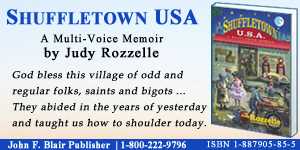With the razing of Shuffletown Grocery and the removal of Mutt and Johnny Rozzelle’s brick home on the hill behind Bud’s Plants…progress has all but eliminated our semi-scenic crossroads community of Shuffletown. The world has become homogenized and we are experiencing the disappearance of hometowns, tractors, cornfields, and minnow farming.
We live in the now and we live in the past, but progress has overtaken Shuffletown. Except for Shuffletown Grill and the Volunteer Fire Department…memory is all that remains. Once Shuffletown was a semi-scenic tourist trap; well, maybe that was a little exaggerated, but not much…for one day in May 1983, Shuffletown was alive with tourists, musicians, a parked parade, and even, an Elvis impersonator. On this day, Shuffletown was mentioned on ABC’s morning show, reporters dined on baloney burgers and sausage biscuits at the Shuffletown Grill, prepared by the women of Cook’s Memorial Presbyterian Church. Phyllis Henline’s senior class students presented a production of “Billy Bob and Miranda,†a play based on Shakespeare’s, “Romeo and Juliet.â€
It was a dazzling, sun-shiny spring day as legend, myth and exaggeration were exchanged; Shuffletonians have always enjoyed sharing unsubstantiated first-person accounts of historic and just plain odd events. A favorite topic for the day was the legend that Abraham Lincoln’s mom, Nancy Hanks, who once worked as a big hearted waitress at the Rozzelle Ferry Inn.
At that time, Shuffletown was home to the world-famous and renowned Shuffletown Dragstrip, minnow farming, and the famous arborists, Maude and Estelle Kerns. The Kerns sisters lived behind a jungle of plants beneath a spreading oak tree in the Southeast corner of the crossroads. The Crown “Quick Mart†now stands where their ancient house once stood. For decades, neighbors in search of buried Confederate treasure assisted the Kerns sisters in digging up most of their yard. When the hole was dug and no treasure was found…the sisters would stick another plant in the ground. Everything, from hostas to sunflowers to daffodils and yucca plants, flourished in their yard.
Little did we know that day in May 1983 that Shuffletown, an American hometown, had only twenty-odd years remaining. Even then, it was an endangered species and that is why the spring festival was aptly named, “The Shuffletown Mayday Mayday Festival and Yard Sale.†Now, Shuffletown is history.
As I sit here musing over these most recent changes, I wonder if the ever popular Southern “eccentrics†are also endangered. The South is a haunted and humid territory that has lived under the shadow of a war lost and a unique partnership with the soil. Newcomers and outsiders, despite the fact that several renowned universities are located in the South, still prefer to believe that we are all uneducated rednecks.
During my stay in Los Angeles, I have met people who have never heard of Charleston, SC. If it wasn’t for the banking industry, well, the truly uneducated would name Charlotte as the capital of West Virginia which is not even a Southern state.
In honor of the passing of Shuffletown, I have gathered a couple of my Southern stories, tales that could have only happened in the South or comments that could have only been made by irrepressible Southern natives. I hope these stories encourage the odd, the wacky, the opinionated, the strong, and the unique to keep up the good work.
I have a friend who hails from a small town in Tennessee who recalls that the city hall janitor also moonlighted as the county coroner. The arrangement worked out well until one day the janitor/coroner released a report that a murder victim had stabbed himself twenty-three times. It was the worst case of suicide ever recorded in Tennessee.
And there is my friend, Loralee, who lives in Washington, DC, and consistently refers to our capital city as “occupied territory.â€
My all-time favorite story of Southern rural life was told to me by a friend who grew up in pocket-sized town in South Carolina. Tyrone was one of the town’s eccentric residents. Tyrone was a pleasant fellow who suffered from the affliction “som’er teeth.†For the unlearned… this meant some of his teeth were gone and some were not. However, the day came when the local dentist pulled the last of Tyrone’s teeth.
Tyrone having never managed to hold down a full time job for longer than a day was spending the rest of his days eating soft food. Since his momma’s passing, Tyrone had depended on odd jobs and the kindness of neighbors to survive. Mostly, Tyrone just hung out waiting on someone to ask him to repair a lawn mower or run an errand. With each visit home, my friend could count on running into Tyrone at which time, they would exchange pleasantries about the weather, wooly worms and fishing. During one visit she noticed that Tyrone had a mouth full of teeth. “Why Tyrone,†she said. “Those are fine teeth you’ve got there. Now you can eat spare ribs and corn on the cob.â€
“You know,†Tyrone replied, “I was down at the funeral parlor and they had a bowl of teeth. It didn’t take long for me to find a pair that fit.â€
Recently, my son-in-law answered a desperate plea. This tale provides hope that the younger generation will carry on our traditions. His story could have happened only in the South. In an attempt to restore sanity to his place of work, he had to shoot a dead rooster.
You see, my son-in-law, Barry, works in an industrial complex. According to this most recent “Jack taleâ€, I have decided that this place, if it was not on the back roads of a Southern city, would exist only in a parallel universe.
They have several acres where their offices are located and a large warehouse. It is surrounded by a fence, but Southerners know…fences rarely deter wildlife. One day, a rooster and a hen jumped the fence and set up housekeeping in their facility. At first, their co-habitation was beneficial to all. The free range hen contributed eggs as rent payment. Her roosting places were unique; she preferred hats, machinery, chair seats and mail boxes. A well-meaning employee built a chicken coop with a fence around it. For a couple of months life was good, the chickens were happy and the eggs were organic. After all, organic eggs lain by free range chickens would cost more than $2.99 a dozen in grocery stores.
Enter the villain, a feral cat. One sultry summer night…the green eyes of a hungry cat peeked over the fence. On this dark night, this feral intruder grabbed the hen and ate her. There were only a few feathers left to signify her existence.
Now, those of us born in the country know that you can’t keep an egg-sucking hound out of the henhouse once he has tasted an omelet. We now know that once a feral cat tastes chicken breasts, they become stealthy and adversarial gourmands.
Did I mention that this is a tragic story? Before leaving work the evening following the hen’s death, Barry decided to shut the rooster up in the chicken coop to protect him from the feral cat.
The next morning, when the first person arrived at work, they went to the chicken coop to let the rooster out into the yard. The rooster stepped out into the open range and began to run in circles. The dismayed rooster was headless, having been recently relieved of his head by the cat.
The tenacious green-eyed villain had climbed to the top of the door, reached in and grabbed himself a neck for breakfast.
Chickens do not die in a tidy fashion. It is not a pretty sight. It just takes a chicken a longer time to “give up the goatâ€, so-to-speak, and lay down dead. City folks aren’t aware of this phenomenon, but country folks are.
To bring calm to chaos, a quick thinking employee stuck a licensed gun into Barry’s hand and begged him to shoot the dead, but active rooster.   Being good souls, before leaving work on that fateful day, they bought a humane trap and stocked it with a fresh chicken breast. The cat took the bait and the feral cat society was called to rescue the cat. Hopefully, the cat has been spayed and is living happily ever after in some yard without chickens. However, I am willing to bet that that cat will always dream of the wild and the taste of fresh chicken. The world changes constantly, but nature never waivers.
While there are plenty of genteel Southern towns, Shuffletown was not one of them. She was a place where our ancestors led hard scrabble lives, we shared our home site with the Catawba River. Shuffletonians were once known as “river rats.†Shuffletonians were cantankerous, knew their neighbors and, well, we were real. Just as many Southern eccentrics are not within shouting distance of observing the world as others may do, but their approach always proves to be on a collision course with reality. It is not that we are not smart and educated; it is only that we prefer to think a little differently…inside or outside of the box. Shuffletown deserves a wake similar to Finnegan’s or at least a womanless wedding to celebrate what once was a semi-scenic community where the men were hardy, the women were tolerant, and the children were free range. May we always remember there once was a place called Shuffletown.


